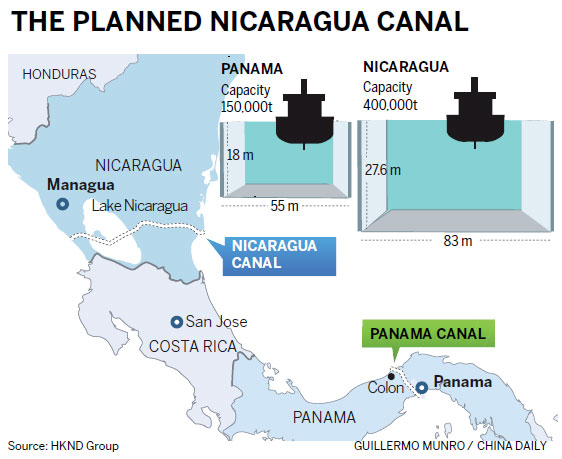New canal a lifeline for energy
 0 Comment(s)
0 Comment(s) Print
Print E-mail China Daily, June 26, 2013
E-mail China Daily, June 26, 2013

The Chinese businessman behind an ambitious plan to build a waterway across Nicaragua to rival the Panama Canal stressed on Tuesday that the new canal will serve as a lifeline for global energy trade when completed in 2020.
Wang Jing, 40, a Beijing native, said at a news conference that the $40 billion project would break ground in late 2014 and complete construction within six years.
Hong Kong-based HKND Group, an infrastructure development company wholly owned by Wang, will be responsible for financing the project before construction begins. But Wang said the project would also introduce global investors, and he has also been in touch with energy companies.
The new canal is expected to generate annual revenue of at least $5.5 billion, according to an initial estimate, because of the increasing Chinese demand for coal and oil in the region and the shift of US energy policy to more exports, Wang said.
Although the Panama Canal has invested $5.3 billion in an expansion project since 2007, Wang said it couldn't meet the growing maritime trade between East and West.
"The Nicaragua canal will be broader, deeper and will allow larger vessels to pass," Wang said, adding that the canal is designed for 400,000-ton-class vessels, compared with the Panama Canal, which only allows vessels with capacities below 150,000 tons.
"The canal will accommodate large LNG carriers and oil tankers from the United States and Venezuela heading toward China," said Lin Boqiang, director of the China Center for Energy Economic Research at Xiamen University.
US shale gas exports to China have little price advantage because of the high cost of getting around Cape Horn - the southernmost tip of South America - but a shortcut will boost the volume, he said.
"The new canal will become a lifeline in global energy trade," Lin said, adding that more imports from the Americas is also in line with China's strategy to diversify its foreign energy dependence on the Middle East.
"The canal will bring significant change to the global maritime trade. There will be vessels tailored for the Nicaragua Canal, and harbors renovated for these vessels," Wang said.
On June 13, Nicaragua's Congress granted HKND Group exclusive rights in developing and managing the Nicaragua Canal and other potential projects, including port projects, free trade zones, airports and other infrastructure projects for up to 100 years.
Wang said he was given "a lot of guarantees and a lot of benefits" by the Nicaraguan government in land use and tax incentives.
The Ministry of Foreign Affairs said last week the canal development was the "independent behavior of a company", after the Ministry of Commerce warned of the potential risks of getting involved in local political disputes.
"We're grateful for the warning of the Ministry of Commerce - this is what a responsible government should do," Wang said, adding that the original blueprint of the canal has been altered to avoid potential territorial disputes.
But Liu Hui, an expert of American studies with the Chinese Academy of Social Sciences, said that the investment in the Latin American country should pay attention to local legal and political risks.
He gave an example of China's oil and railway investment in Venezuela, which met strong resistance from local unions.
Wang admitted that the project has political, financing and engineering risks, but said the fact that HKND Group stands out from other competitors was evidence of its thorough preparation.
HKND Group is working on the feasibility report with leading firms such as US-based McKinsey & Co, UK-based environmental consulting services provider ERM Group Inc and China Railway Construction Corp, China's biggest construction company.
"Legal papers are also being formulated, and there are no risks of violation at this stage," Wang said.
Besides his 40 percent stake in the Beijing Xinwei Telecom Technology Co, Wang said he also has mining investments with 100-ton gold reserves worth about $5 billion in two Southeast Asian countries. Wang's investment also involves an aerospace company, which is expected to be a future partner in the canal project.
Wang's canal investment may fulfill a century-old dream for Nicaragua, which has attempted to construct an inter-oceanic channel on several occasions since the mid-1800s.
Wang said the canal project will create more than 40,000 local jobs, and a job-training program has already begun.
"It is no longer a pure investment, it has become a milestone," Wang told reporters. "So I don't want it to become an international joke or an example of a failed overseas Chinese enterprise."






Go to Forum >>0 Comment(s)